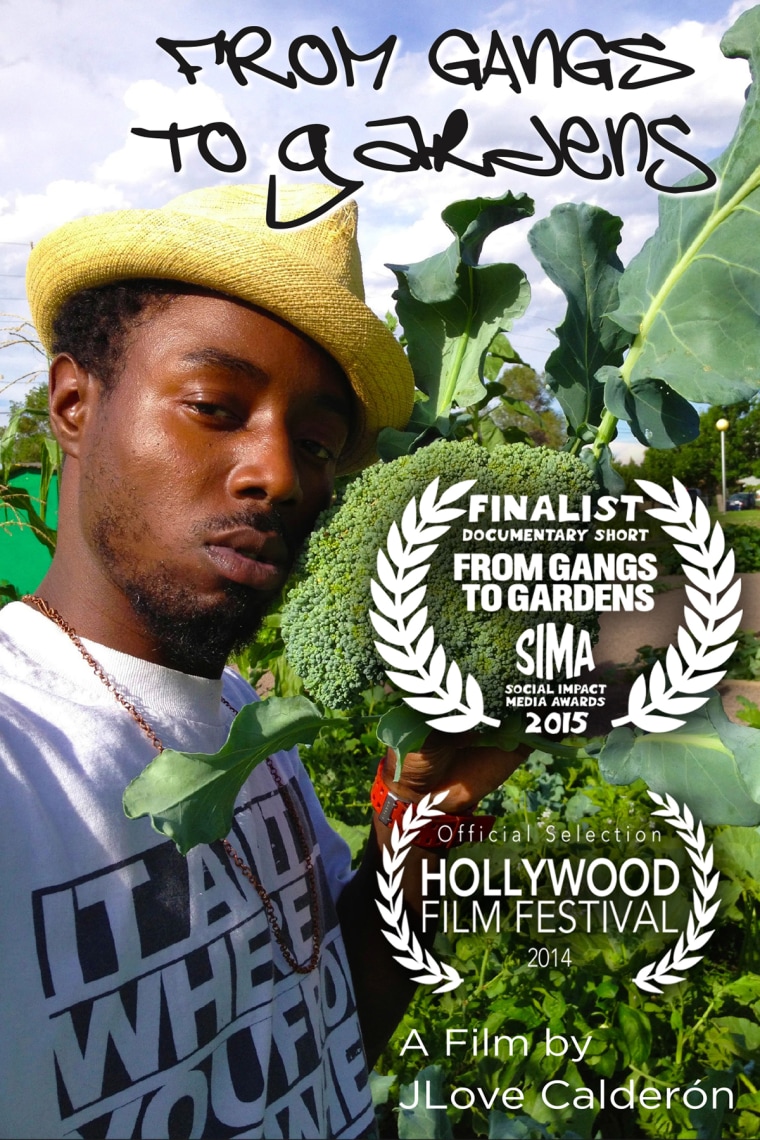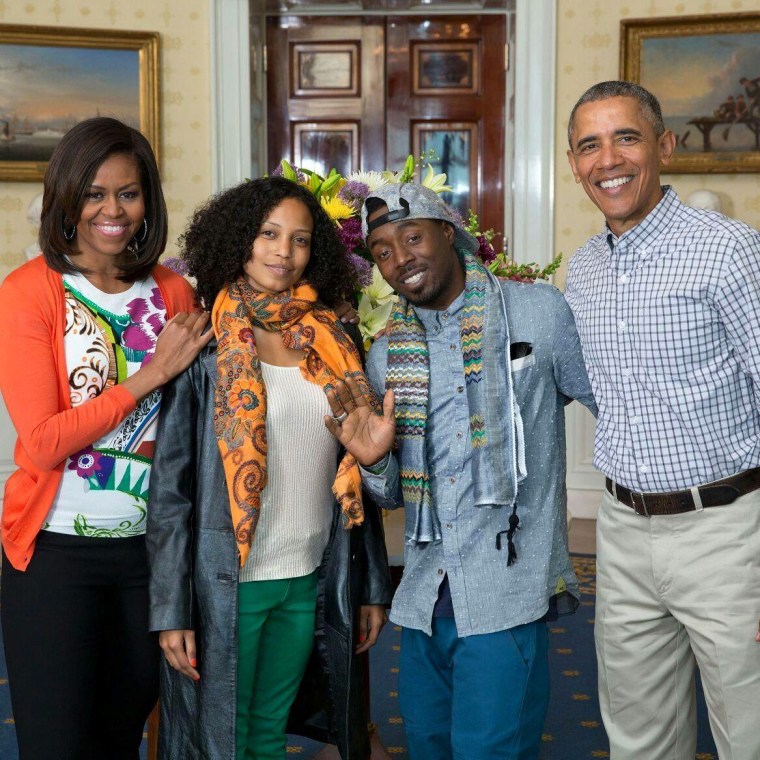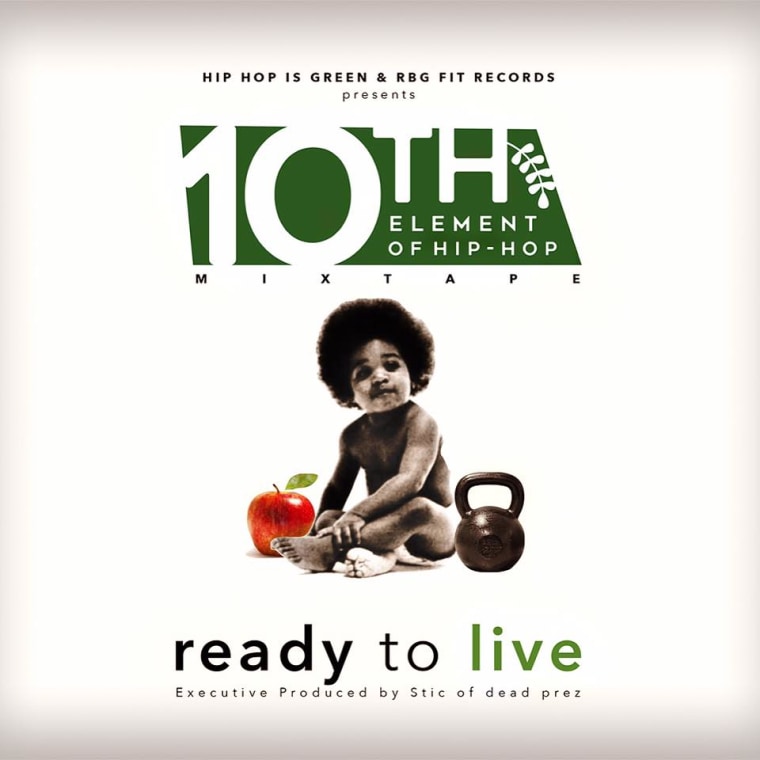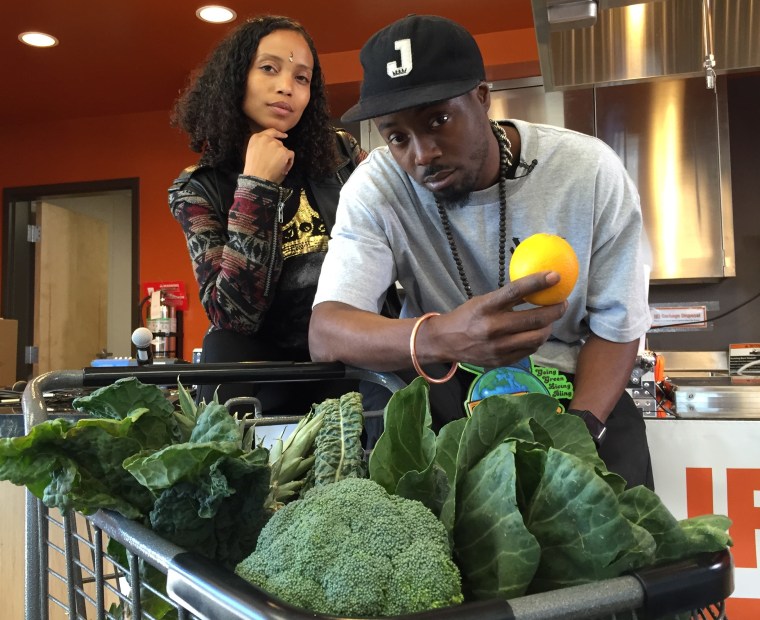Ietef Vita has a dream.
The Denver-based environmental activist and recording artist best known as “DJ Cavem Moetavation” longs for a time when he’ll be able to stroll the streets of any black neighborhood in America without passing by a sea of liquor stores and fast food joints.
A greener time. When farmer’s markets stocked with fresh fruits and veggies would inhabit every corner; yoga studios and juice bars would abound.
RELATED: Flint's Water Crisis Could Slow Its Housing Recovery
Instead of concrete and litter in every direction, freshly-planted trees and community gardens would be commonplace; black people would self-medicate with nectarines instead of narcotics and try cannabis in lieu of chemotherapy.
Vita, 29, is a 2014 Music Educator Award Grammy nominee whose repertoire of seminars and community programming includes a culinary concert called "Food On Fleek" and screenings of his short documentary "From Gangs To Gardens."
The environmentalist recently spoke to NBCBLK contributor Chandra Thomas Whitfield about what inspires him to mix hip hop and horticulture for the good of humanity.
You’re considered the founder of a musical genre you call EcoHipHop — sort of gangsta rap gone green. How do you define who you are and the work you do?
I am from Denver's historical Five Points [community] and I’m an OG – organic gardener.
I’m an emcee, father, husband, midwife, producer, environmental activist, deejay, Founder and Executive Director of Going Green Living Bling. I have an album out called "The Produce Section" that’s available on iTunes and you can stream it for free on Spotify. I wear many hats.
You are probably best known for the Going Green Living Bling movement, what is it?
That’s the name of an organization that I started in 2003. We focus a lot on environmental curriculum design and taking our curriculum to schools and community groups. I also partner with my wife’s company, Art of Glo, to host lectures and workshops in culinary wellness, with a focus on raw and alkaline foods, mind and body holistic health and mindfulness.
Sometimes I’ve had to disguise yoga as breakdancing, math and engineering as music production and language arts as poetry and spoken word.
I also present a lot on urban organic farming, holistic healthcare, (environmental) sustainability and green job development. One of our goals is changing the perception of hip hop, which originally was a positive movement and literally meant ‘intelligent movement.’ As the commercialization of hip hop progressed into a multi-billion dollar industry, corporations began partnering with hip hop to use it as a platform to market destructive ideas, imagery and, more importantly, bringing unhealthy food to consumers.
I believe there’s a place for hip hop to have a role in the positive change that we need in our community.

What inspired you personally to merge hip hop with environmentalism?
Basically, because I wanted to have more control over what’s happening in my community and I wanted to inspire others to do the same. My work is all about changing the mindset. It’s gotten to the point that the practice of (environmental) sustainability is associated almost exclusively with white people.
The reality is that sustainability is what Africans in America have been doing for centuries: growing collard greens in the backyard, eating healthy, composting, recycling and reusing and repurposing items.
I’m trying to get the black community back into those things. I also want us, as a community, to get more involved in the development of green jobs because that’s the future.
What can you share about your diverse mix of programming?
My goal is to promote the idea of holistic health, permaculture, urban agriculture, yoga and culinary wellness. Unfortunately, sometimes there’s almost a resistance to anything like that in our community.
For example, in my school programs sometimes I’ve had to disguise yoga as breakdancing, math and engineering as music production and language arts as poetry and spoken word.
I try to teach the students about how they can create their own business in urban agriculture. I also have a curriculum that introduces educational plant-based cooking, as well as juicing and raw foods. I have a lecture series that covers EcoHipHop, food justice, gang intervention, race and politics, organic gardening and graffiti art. I even lead a class called HipHop Yoga.

What are some of the barriers you feel keep the African American community out of the environmental movement?
A lot of our original ancestral heritage toward healthy living and eating is lost; we’ve since adopted a sugar-based and meat-based diet. The time has come where communities of color should look to embrace ideas of sustainable holistic health for the mind and body and not shun it because of cultural differences.
A lot of the traditional recipes that are accepted in our community are destroying our bodies. We need to change that.
Many times in our beautiful black community we don’t stretch ourselves enough – figuratively and literally. That’s why I talk about wellness on a large scale; we’re surrounded by liquor stores and processed foods and, as a result, we have all of these health issues like diabetes, hypertension and issues with our joints.
We’re taking all these medicines when sometimes all we need to do is go to the gym, juice, grow some food and practice mindful movement and meditation. A lot of the traditional recipes that are accepted in our community are destroying our bodies. We need to change that.
When you boil it all down, what is your overarching objective?
I don’t want to see any more thug life – I wanna bring that kale life to our community. Now, that would be really beautiful!

DJ CavemSpeaks: Five Ways to Go Green Starting Today
Let It Grow
“Grow what you eat. Start growing some small plants and flowers. I say it’s better to grow fruits and vegetables in your front yard instead of grass. You can start a small garden in your backyard or start small growing some simple plants on your windowsill. An extra bonus is that you’ll also learn the virtue of patience by watching something grow.”
Conservation Is Key
"Conserving water is important to the planet. You can start by doing little things like not running the sink (water) while you brush your teeth or not flushing the toilet every time for some things like tissue for your nose. Harvesting water is also important; just put some large barrels outside to capture rainwater that can be reused in your garden.”
Invest In Your Health
“Invest into holistic health; try out some organic foods and plant-based recipes. Spend some time learning about how what you consume impacts your body. Maybe do a short fast or try out a healthy meal plan. Consider doing something like ‘meatless Mondays’ or go meatless every day. Start small — one day a week even — and work yourself up to more days.”
Juice It Up
“Open up a juice bar or support one. Instead of a lemonade stand, set your kids up with a juicer and have them sell fresh juices in your neighborhood.”
Plant It Out
“Next time you eat an apple or some watermelon, embrace the idea of sustainability and save the seeds. You can plant the seeds you save or give them away. You can also store them in glass jars for future crops. Also, consider planting a tree; trees help bring some beautiful oxygen to the environment.”

